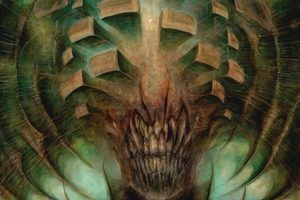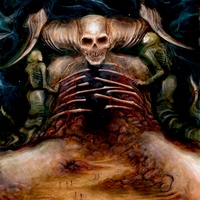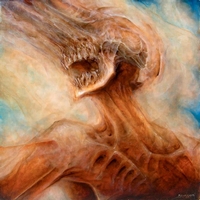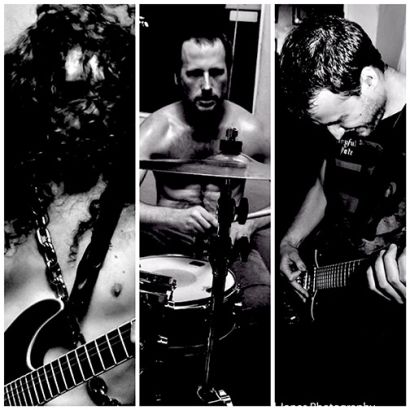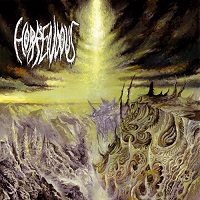Horrendous – A Big Death Metal Family
Wednesday, 24th October 2018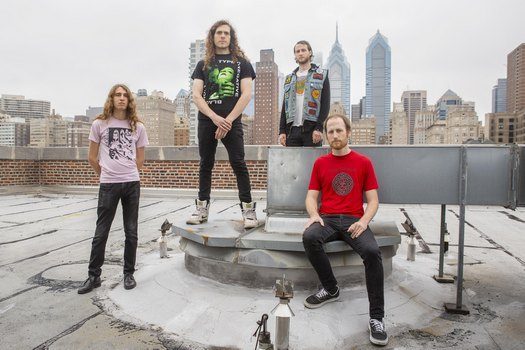
Seemingly making more and more waves with each passing release, Horrendous are one of the death metal acts that are on the tip of any enthusiast’s tongue. For good reason too, as their continued foray into more progressive and unexplored waters in the genre makes them an easy target to latch onto. Sure, there are some influences abound, but each release (always coupled with some phenomenal artwork) has seen them come more and more into their own.
Their most recent effort, Idol, saw the band jump from a 3-piece to a 4-piece with a now-dedicated bass player joining the mix. It also saw them continuing to pack in some layers of complexity that need to be peeled away with successive listens, making the album a real treat. We were able to talk to all four members of the band and discuss some outside the box questions, such as how their friendships impact songwriting, what it’s like to work in a band half-comprised of brothers, as well as dig into what adding a bass player really brought into the band.
Dead Rhetoric: What do you feel has been key to generating some buzz around the band for the last few albums?
Matt Knox: Strangely enough, we were just talking about how there was no buzz for this album. It’s probably very false…we are just being foolish. But I think as far as I can tell, I don’t think there’s a magic formula for it. We just try to take a step forward each time and we’ve been lucky enough to catch people’s attention.
Damian Herring: We have also been lucky to have magazines like Decibel. They have been pretty supportive of us along the way, and it’s given us some good exposure in getting people to put their ears around our albums. I think it’s been more of a snowball effect since the beginning.
Dead Rhetoric: You banged out the first three albums fairly quickly. Why the 3 year wait for Idol?
Jamie Knox: I guess probably a lot of circumstances contributed to the wait. The Chills and Ecdysis were recorded very gradually over a year or so for each one. I feel like we were writing stuff in the background during that time. The stuff for Anareta came together really quickly, and we thought it would be cool to do a Judas Priest type thing and put out an album every year. The pieces fell into place, and Dark Descent [Records] was up for doing it quick. At the time, Matt and Damien were able to spend almost a month together doing all of the recording except the drums. That really streamlined the process and made it pretty organic.
This time, the writing was done more gradually, but the recording could only get done over the weekends over about a 10 month time period. We would go down to Damien’s house about two weekends a month, spend the weekend recording and come back. It took way longer than we thought it would this time, and we are on Season of Mist now. With Dark Descent, we would send the songs and the album would be out in like a month and a half. With Season, they had everything in April – that’s just the way it works with bigger labels.
Dead Rhetoric: Was the move to Season of Mist one to make sure the band keeps expanding their reach?
Jamie Knox: That was definitely a factor. Obviously they have a massive European presence, which is something we haven’t experienced so far so we thought that would be nice. They also have a varied roster, which is cool too – lots of bands that play different styles. We also know a lot of the guys at Season, so it seemed like a good fit for a lot of different reasons.
Dead Rhetoric: What sort of steps forward do you think that Idol contains?
Matt Knox: I think that any subsequent album that comes out, we are trying to one-up ourselves and challenge our abilities and songwriting. I can speak for myself, in approaching the new songs that there is a lot more attention on creating interesting rhythms. I’ve gotten tired of hearing the same drum beats in metal all the time and having the same cadence and riffs, and I wanted to expand on those things. That was definitely a different approach than what we had done before.
There was a specific focus on creating unique drum beats, bass lines, and fitting everything together in the sense of things we haven’t done before. The only beats that come to mind that are common are at the beginning of “Devotion (Blood for Ink)” where there’s a d-beat. Anything else that is pretty typical doesn’t last for too long. It’s like short bursts and other things. That rhythmic presence and idea of layering and building on a theme – then having a theme be revisited later in the song…doing all of these things to create a more unique experience on a metal record.
Dead Rhetoric: As a band that has consistently had strong artwork, what’s most important about a cover to you?
Damian Herring: Obviously it has to be aesthetically pleasing to us, and it has to match the vibe of the music. With Idol in particular, it’s actually the first time that we had used a piece by Brian Smith that was already painted. With previous albums, like Anareta and Ecdysis, we commissioned those. We gave him some ideas – more on Ecdysis and less on Anareta, but we gave him some ideas to jump off of. With Idol, it was a piece that he had already done, and when we saw it we felt it was the perfect representation of the album, both musically and with the themes found within the lyrics.
Matt Knox: I think Damian found Brian Smith just by typing “surrealist painting” on Google. There’s actually a really great story behind all of this, that once we found his work and seeped ourselves into his work, we contacted him and he had said he tried working with bands in the past but their expectations were too rigid. I think the rigidness of the expectation stressed him out – people were dictating what they wanted to do, and it ended up being a terrible piece, at least in his eyes. He was on the fence about working with us, and we somehow convinced him to do it, so we gave him the reins.
We gave some color direction and some files, but everything came from him. One of our biggest considerations when we chose him in the first place was just how unique it looked. I know growing up, and I know that Jamie feels this way, we have loved listening to bands that have a niche and aesthetic. Having covers that you can point to and immediately say that it’s ‘this band’ because of the artwork. The punk band Hot Water Music comes to mind – all of their early albums had the same artist and same style, and no other record covers look like that. I think the desire to have that, with our name, was a really important element for us.
Dead Rhetoric: So ideally, you’d like to continue working with him in the future?
Damian Herring: Yeah, as long as he’s willing.
Matt Knox: Each time we have an album we hit him up – it’s worked out so far.
Jamie Knox: Who knows what the future will hold. We are never quite sure. I think bands routinely ask him to work with them and he won’t do it, so it’s kind of amazing that we have this unique artistic voice and vision. We really don’t give him a ton of direction – I think there’s a unique synchronicity between us. What he creates influences what he creates and vice versa. We are both very independent artists in what we do, and there’s some force that binds what we do together, and it’s amazing to see every time.
Dead Rhetoric: You added a dedicated bassist in 2016, how has that aided the band’s sound?
Matt Knox: It adds an entirely different and unique perspective to the music. I’m actually interested to see what Alex thinks about this question. In the past, it was Damian and I that were writing all the bass lines and we traded off every song. I remember on Anareta just trading it back and forth. While it was great fun, it was also really difficult because 9 times out of 10 the bass lines tended to be more difficult than the guitar, because we treated it as this open sandbox of exploring. I honestly couldn’t play a single bass track through Anareta if you gave me the instrument right now. It would be impossible. Nearly every moment of that album doesn’t repeat.
There are a lot of melodic ideas going on, and as a band in general our philosophy when we have different ideas on a riff or part, the default answer is always, “Let’s just do it differently this time” and we use up all the ideas. That tended to happen with bass. This time around, having someone around who is more knowledgeable and has a much higher playing ability on the instrument than we do – Jamie, Damian, and I were kind of in the captain’s seat watching Alex play the bass lines and offering input, but it was a much different landscape from the past, with so many more new possibilities. Anything I could sing, he could play. It was like infinite possibilities.
Jamie Knox: It was also unique having someone from the beginning thinking about bass. Like Matt said, he and Damian spent a lot of time on it, but they literally wrote bass while they were recording it and were just having fun. It wasn’t an afterthought, but it kind of was. Someone was thinking about bass 8 months before we started recording.
Alex Kulick: They hit the nail on the head in a lot of ways, but you can imagine how fun it was to come into it when they are saying, “Do something different every time” and I’m an improvised music person. I came to Philly chasing after experimental, improvised music in jazz and whatnot. So it was like, “Oh, it’s like a bass solo all the time in a subtle way!” It fits the song and has some finesse to it. The way that they were already thinking about its role allowed me to enter naturally – it’s the most fun way of writing bass lines to me.
If you are someone who gets asked to play, and you come into a band that has been around for 8-9 years, you have to play the parts and there’s some formalism, but from the start, they were like, “You want to play something there that you think would sound cool? Go ahead!” I learned every bass line from that I possibly could when we did live shows. I used that as the source material, but they were down for whatever I wanted to do. They trusted my ear and that I’m trying to serve the music in a way that was meaningful. It made getting into the group a lot of fun. I interacted with everyone in the way it was recording and there was a collaborative effort and I hope that my presence has only helped in that, and not getting in the way.
Dead Rhetoric: How important is the band’s relationship towards each other in terms of songwriting and friendship?
Alex Kulick: Every band has relationships and it shapes the way the band is. I have played in a lot of bands in a lot of different settings, and have many people I know in music – I can’t even tell you how many, but I’ve been lucky enough to meet people from across the spectrum. The relationships of all four of us, at least from my perspective, and I wasn’t there from the beginning, but it’s a major fueling point for everything. I got asked to fill in for Horrendous after I met Matt in a coffee shop one day. We had jammed once at my house because we were interested in getting together. I’ve been asked to fill in for a lot of different things. It’s because of the relationship that sparked from the get-go, that it was more than just a fill-in and band. They were these people that I immediately fell in love with.
Matt and I have lived together for the past year. We just moved out but we were roommates. Every time I see Damian I laugh so hard I can barely function. Even in my short time, the bond is the band is so deep, its insane. It lends to the experimentation and songwriting – the process is expansive and goes through a lot of changes. It allows the process to be effortless – it’s torture in some ways, because making art that you care about it torture, but there’s a backdrop to it that is really special. There’s some crazy special shit!
Matt Knox: I imagine other bands and people who make music having a trajectory of what they want to do, and there seems to be a shelf-life of sorts for the band. If you ask them if they are going to still be a band in 10 years, I think most people would probably say they don’t know – they don’t know what will happen the following year. I think for us, regardless of where things go in terms of press, touring, and being in the spotlight, that is not a factor in why we are doing this.
It’s great that it’s happening and we are stoked about it, but in the back of our minds, I think we also just know that making the best possible music we can is something that will always continue. I think that’s something that may separate us from others in the sense of the goal and purpose of what we do being very intrinsic. It’s a self-motivator and we love what we are doing together. I don’t foresee that ever stopping.
Dead Rhetoric: Do you feel that the trust between you allows for a lot of the experimentation, without having that fear of going too far?
Matt Knox: I would definitely say so. It’s not only about the pushing of boundaries, it’s also about when you have an idea and you bring it to the table and there’s a certain level of trust is there. I have this huge level of excitement of bringing things I’ve made to the table, because you just know that what I bring is going to 10 times more interesting than when I imagined it. I think that’s also kind of rare in a creative space. A lot of people are very selfish about what they want, and want to have the thought and idea of something being theirs. It’s their unique expression of myself that I bring to the table and you are going to learn this part and play it.
I think being in a space that there’s such comfort that when you bring something up, it’s going to be changed, and changed for the better brings confidence that whatever you could possibly come up with is going to be expanded up and fully developed. I think it makes it easier to bring things to the table, because it doesn’t have to be perfect. Everyone is going to add their own spin, and it will be this incredible thing that no one could have made on their own.
Pages: 1 2











